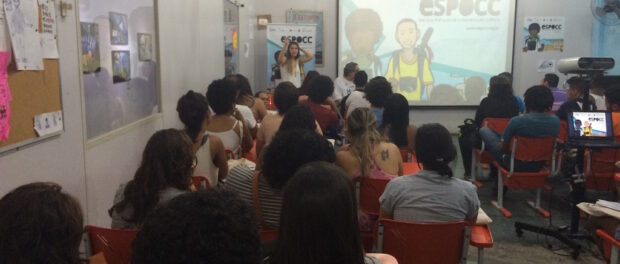
On July 14, the Popular School for Critical Communication (ESPOCC) launched its 2015-2016 class on Affirmative Publicity at Observatório de Favelas (Favelas Observatory) in Complexo da Maré, in Rio’s North Zone. Each year, after a competitive application process, the school chooses 90 current or graduated high school students from all over Rio to participate in the free course, which is broken down into two groups—one with an emphasis on audiovisual skills and the other on digital creation.
Civil society organization Observatório de Favelas created ESPOCC in August 2005 with the purpose of “offering residents of popular spaces in Rio de Janeiro access to different languages, concepts and techniques in the area of communication in order to produce communicating citizens and multipliers of knowledge, thus preparing them for integration into the job market and helping them exercise their citizenship in full.” In 2012, with the sponsorship of Petrobras and the support of the School of Communication at the Federal University of Rio de Janeiro (UFRJ), ESPOCC ran its first course on Affirmative Publicity.
Executive Coordinator of ESPOCC, Eduardo Alves, welcomed the students at the 2015-2016 inaugural class, telling them: “You have arrived here to live together, create, and enlarge.” He continued by stressing the importance of Observatório de Favelas and ESPOCC in building a new concept of “favela” that counters the stigmatized vision of violence and neglect often portrayed by the mainstream media. He said: “A favela is a place of potential and not of absence… What identifies a favela is not what it lacks, but rather the capacity of its people, with little assistance from the state, to invent their encounters, their art, their mobility, their houses…this potential for invention, this is what identifies a favela.”
Professor and project coordinator Rodrigo Azevedo explained the objective of Affirmative Publicity and what the students will learn in the upcoming classes: Affirmative Publicity is publicity that “promotes values of sociability, culture, community and environmental entrepreneurship by adapting or undermining the language, the tools, and the organization of traditional advertising.” It can help de-stigmatization by producing representations of favelas by their own residents.
“You will learn communication, advertising, without having any prior links, or without having any commitment to a line of products and services,” said Azevedo. “Our great challenge is to make advertising an instrument that puts life above profit.”
Next, teacher Camila Santos outlined the structure of the upcoming classes for the students of both the audiovisual and digital creation classes, who will proceed to meet separately three times a week for 42 weeks.
Each week, both groups will have one technical class, one class on communication itself, and one theoretical class on critical communication. Although the two groups will have separate technical media focuses, including different stages of production for audiovisual students and Photoshop and web design for the digital creation students, both groups will take classes on communication, culture and society. These classes will cover the role and purpose of Affirmative Publicity, marketing, copyright, and ethics, among many other topics.
The first class came to an end with the screening of two video interviews of previous students discussing their own initiatives on ESPOCC’s blog, Blogspocc. Also presented was a promotional video of ESPOCC’s monthly activity, ESPOCC Dialogues, where ESPOCC students can go to Observatório de Favelas’ spaces to debate and discuss their ideas, questions and productions with “thinkers, inventors, academics, or inspiring people.”


